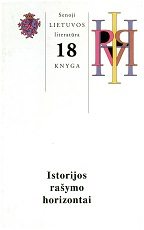Pamokslas XVIII a. antrosios pusės LDK visuomenėje
Sermon in the second half of the 18th century society of the grand duchy of Lithuania
Author(s): Kristina MačiulytėSubject(s): Literary Texts
Published by: Lietuvių literatūros ir tautosakos institutas
Keywords: possible functions of the sermons with regard to the cultural and social context of the particular period
Summary/Abstract: The article purports evaluating possible functions of this genre with regard to the cultural and social context of the particular period. In the Age of Enlightenment, special emphasis was laid on the request for energetic activity of the clergy in the parishes, this becoming an important argument for reforming educational programs. The manual for pastors, published in Vilnius in 1793, not only presented summation of the principles of spiritual life, but also gave practical economic advice. Such attempts at combining religious teaching with utilitarian purposes got reflected in sermons by Vilhelmas Kalinskis and Mykolas Pranciškus Karpavičius. In his sermon “On the Obligation of the Masters to Love the Subjects for the Sake of their Souls […]” the latter liberally referred to the works by the famous physiocrate Antoni Poplawski, sometimes even copying his entire thoughts.Another issue requiring attention is the relationship between sermons and periodicals. The newspaper Gazety Wileƒskie presents ample information regarding public speeches of the clergymen given on various occasions, yet remaining unpublished. Certain proximity of sermons and publicist writings in terms of themes and expressions is also in the focus of researchers. The needs and interests of its addressee largely determine the character of the sermon. This was something that special instructions to the preachers issued by the bishop Ignotas Masalskis encouraged the priests to pay attention to. Along with catechetic preaching directed at the parishioners, the possibilities of using sermons for political and social purposes were sufficiently extended. Until the Lithuanian and Polish Commonwealth State ceased its existence, the clergy remained an active member of the political life as well as its expert, contributing considerably to the formation of the public opinion.
Journal: Senoji Lietuvos literatūra
- Issue Year: 2004
- Issue No: XVIII
- Page Range: 213-224
- Page Count: 12
- Language: Lithuanian

